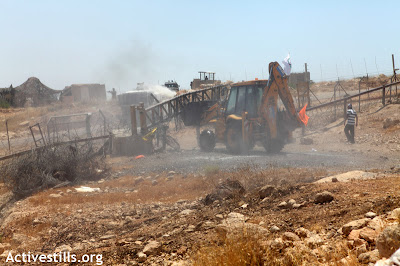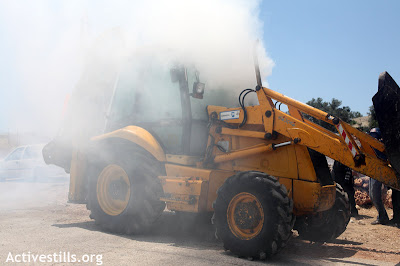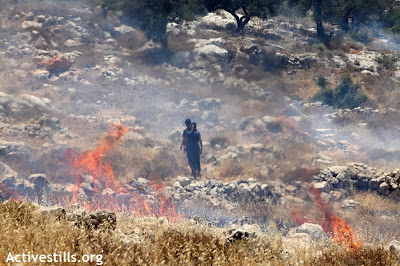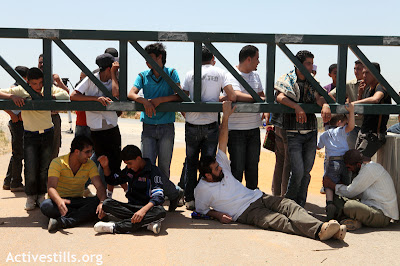
(c) Anne Paq/Activestills.org, Khaled Zwahra just before his arrest, Al Naksa Day Demonstration, Qalandia refugee camp, 05.06.2011
See below an update on Khaled Zwahra who was abducted during a demonstration in Qalandia checkpoint on 05.06.2011. I was standing just a few meters away when Khaled was violently taken away by Israeli soldiers in their jeep. Some minutes before the "abduction", Khaled was courageously trying to stop the military truck that is used to spread the infamous "skunk" on protesters. The skunk is an horrible and noxious chemicals-based liquid which carries an awful smell which can make you throw up. Khaled got soaked into the liquid and was later on pepper sprayed in the face to make him go. Then he stood up in defiance in front of the Israeli soldiers, refusing to go, claiming for his legitimate rights.
He then sat down in front of a military jeep which was trying to intimidate the protesters and invade the refugee camp. This is where the soldiers had enough of all these "outrageous" acts of resistance and jumped on him. I basically watched him all the time before his arrest as he was one of the most active in front of the soldiers. When I followed up on him, I was stunned to hear that he was charged with stone throwing! he did not of course.
Well...this is not first time really that Palestinians active in the popular resistance got charged with made-up charges. Khaled comes from Nabi saleh, a village which organizes weekly popular resistance protests for more than a year and an half and has faced an incredible level of repression by the Israeli army.
So yes- Standing for your rights as a Palestinian using non-violent tactics to protest has become a crime for Israel. While Western governments condemn vehemently the crackdown on protesters in other Arab Countries, their silence is screaming when it comes to Palestinians. Khaled is not a criminal, he is a Palestinian, an activist, a human rights defender, a hero of our time.
Update
Khaled Zwahra was detained on 5.6.2011 during Naksa Day protests in
Qalandia while blocking an army vehicle that was about to invade further into residential areas of Qalandia).
He was taken to Atarot police station (in Qalandia industrial area, operated by
the border police), where he was suspected of participating in an unauthorized
demonstration and disturbing a policeman/soldier on duty.
Only the following day, 2 border policeman - one of whom wrote a report
on the day of arrest, incriminating Khaled only for the above mentioned offenses -
"remembered" that he also threw stones, and gave a very weak statement
against him.
Although there are several videos and photographs that show that Khaled was
arrested while blocking the army vehicle, and despite the weakness of
the border policemen testimonies, on June 12th he was indicted and charged also with
"stone throwing". The military court in Ofer ordered his arrest until the end of the proceedings.
Khaled's lawyers appealed against the remnant decision and on June 15th
there was a hearing in the military court of appeals. We are currently
waiting for the appeals court decision regarding the arrest, and making an
effort to get the decision as soon as possible.
The first hearing in the trial itself (reading of the indictment and
answering to the charges) will take place on July 13th.
------FRANÇAIS-------------------------------------------------------------------------
Voir ci-dessous une mise à jour sur le cas de Khaled Zwahra, qui a été "enlevé" lors d'une manifestation contre l'occupation au checkpoint de Qalandia 05.06.2011. Je me tenais juste à quelques mètres de lui quand Khaled a été violemment embarqué par des soldats israéliens dans leur jeep. Quelques minutes avant l'«enlèvement» Khaled s’était mis courageusement devant le camion militaire qui est utilisé pour propager l'infâme "skunk" sur les manifestants. Ce liquide nauséabond et nocif, à base de produits chimiques, dégage une odeur terrible qui peut vous faire vomir. Khaled était trempé et a été ensuite aspergé de spray poivré dans le visage. Mais refusant de partir, il a continué à se tenir debout au mépris des soldats israéliens et à revendiquer ses droits légitimes. Il faisait le signe de la victoire à quelques centimètres des soldats.
Il s'est assit en face d'une jeep militaire qui tentait d'intimider les manifestants et d'envahir le camp de réfugiés. C'est là que les soldats en ont eu assez de tous ces «scandaleux» actes de résistance et ont sauté violemment sur lui.
J'avais mon objectif braqué sur Khaled tout le temps comme il était l'un des plus actifs devant les soldats. J'ai donc suivi tous ces gestes alors qu'elle n'a pas été ma stupéfaction quand j'ai appris qu'il était accusé de jets de pierres!
Enfin ... ce n'est pas la première fois vraiment que des palestiniens actifs dans la résistance populaire se font mettre en prison à cause de charges d'accusation fabriqués. Khaled vient de Nabi Saleh, un village qui organise des manifestations hebdomadaires depuis plus d'un an et demi et fait face à un niveau incroyable de répression par l'armée israélienne.
Donc oui-Se battre pour vos droits en tant que Palestinien en utilisant des tactiques non-violentes pour protester est devenu un crime selon Israël. Alors que les gouvernements occidentaux condamnent avec véhémence la répression contre les manifestants dans les autres pays arabes, leur silence est criant quand il s'agit des Palestiniens. Khaled n'est pas un criminel, il est un Palestinien, un militant, un défenseur des droits humains, un héros de notre temps.
mise à jour
Khaled Zwahra a été arrêté le 06/05/2011 lors de la manifestations pour commémorer la Naksa à Qalandia alors qu'il bloquait un véhicule militaire qui s'apprêtait à envahir les zones résidentielles de Qalandia.
Il a été emmené au poste de police de Atarot (dans la zone industrielle de Qalandia, exploité par la police des frontières), où il a ete soupçonné de participer à une manifestation non autorisée et d'avoir perturbé un policier / soldat en faction.
Seul le les jour suivant, deux policier des frontières - l'un d'eux avait deja écrit un rapport le jour de l'arrestation qui incriminait Khaled seulement pour les infractions mentionnées ci-dessus - se sont "rappelé" qu'il avait également jeté des pierres, et ont fait une déclaration très faible contre lui.
Bien qu'il existe plusieurs vidéos et des photographies qui montrent que Khaled a été
arrêté alors qu'il bloquait le véhicule de l'armée, et malgré la faiblesse des témoignages des policiers des frontières, le 12 Juin il a été inculpé et accusé aussi pour «jets de pierre". Le tribunal militaire d'Ofer a ordonné son arrestation jusqu'à la fin de la procédure.
Les avocats de Khaled ont fait appel à la décision et le le 15 Juin
il y eu une audience à la cour d'appel militaire. Nous sommes actuellement en attente
de la décision du tribunal d'appel concernant l'arrestation, nous faisons un
effort pour obtenir la décision dès que possible.
La première audience du procès lui-même (la lecture de l'acte d'accusation et
la reponse aux accusations) aura lieu le 13 Juillet.































